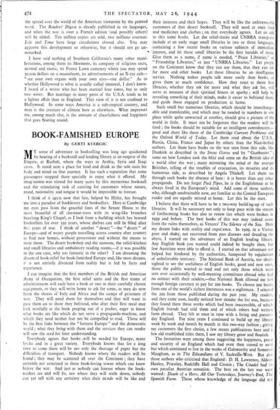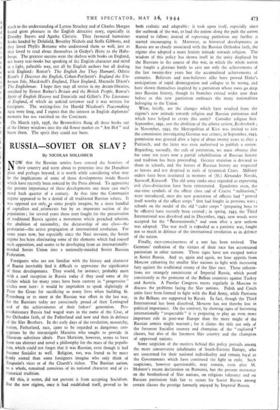BOOK-FAMISHED EUROPE
By GERTI KVERGIC
MY sense of adventure in bookselling was long ago quickened by hearing of a bookstall and lending library at an outpost of the Empire, at Rutbah, where the ways to Arabia, Syria and Iraqi cross. It stood next a place for food and drink as the sole oasis for body and mind on that journey. It has such a reputation that some passengers stopped there specially to enjoy what it offered. My imag-nation was stirred for many years by this mysterious bookstall and the stimulating task of catering for customers whose nature, mind, nationality and tongue it would be impossible to foresee.
I think of it again now that fate, helped by Hitler, has brought me into a paradise of booklovers and booksellers. Here at Cambridge my eyes pass from the graceful lines of the Senate House to the most beautiful of all chestnut-trees with its wing-like branches brushing King's Chapel, as I look from a building which has housed booksellers for over 35o years, whose shelves can still be filled after five years of war. I think of another " desert "—the " desert " of Europe—and of weary people travelling across country after country to find new homes, without possessions and without the means to store them. The desert bookshop and the tearoom, the relief-kitchen and small libraries and ambulatory reading rooms,—if it was possible in the one case, why too fantastic in the other? I am dreaming the dream of book-relief for book-famished Europe and, like most dreams, it is not entirely divorced from reality but is fed by facts and experience.
I can imagine that the first members of the British and American
Army of Occupation, the first relief units and the first teams of administrators will each have a book or two in their carefully chosen equipment, or they will write home to ask for some, as men do now from the shores of Italy and Africa and the camps of prisoners of war. They will need them for themselves and they will want to pass them on to those they befriend, who after their first meal may leak wistfully at the book peeping out of a pocket, eager to know what books are like which do not serve a propaganda-machine, and which they need neither fear not be compelled to read. Those will be the first links between the " fortress Europe " and the democratic world ; what they bring with them and the services they can render will sow the seed for later understanding.
Everybody agrees that books ,will be needed for Europe, many books and in a great variety. Everybody knows that for a long time to come there will be not only the shortage of paper but the difficulties of transport. Nobody knows where the readers will be found ; they may be scattered all over the Continent ; they have certainly not remained in those book-loving towns which one knew before the war. And just as nobody can foresee where the book- readers are and will be, nor where they will settle down, nobody can yet tell with any certainty what their minds will be like and their interests and their hopes. They will be like the unforeseeable customers of that desert bookstall. They will need at once food and medicines and clothes ; on that everybody agrees. Let us add to this some books. Let the relief-trains and UNRRA transports include at an early stage small libraries in two or three languages, containing a few recent books on various subjects of immediate interest, and let those small libraries be the first heralds" of more. Give them as a name, if name is needed, " Peace Libraries," or " Friendship Libraries," or just " UNRRA Libraries." Let people on the Continent know that they can use them, that they can ask for more and other books. Let those libraries be an intelligence service. Nothing makes people talk more easily than books, or gives them so much confidence. How they react to those first libraries, whether they ask for more and what they ask for, will serve as measure of their spiritual fitness or apathy ; will help by revealing something of their minds, make it easier to befriend them, and guide those engaged on production at home.
Such small but numerous libraries, which should be interchange- able and transferable, and which may be needed in numbers in one place while quite unwanted at another, should give a picture of the world in little. It must not be forgotten that the readers will be tired ; the books should be suitable for an intelligent convalescent,— good and short like those of the Cambridge Current Problems and the Oxford World of Today. Let them read about the U.S.A., Russia, China, France and Japan by others than the Nazi-bribed authors. Let them have books on the war seen from this side, like Dunkirk as described in the Snow Goose and by " Gunbuster" ; some on how London took the blitz and some on the British idea of a world after the war ; many mirroring the mind of the average Britisher, telling of the troubles of evacuation, its miseries and its humorous side, as described by Angela Thirkell. Let them see through such books the absence of hate: it is better than any other propaganda. Do not forget Pied Piper, he is the Englishman as he always lived in the European's mind. Add some of those authors, who, although unobtainable now, are familiar to the Central European reader and are equally missed at home. Let this be the start.
I believe that there will have to be a two-way building-up of such libraries. It will be necessary not only to keep pace with the stream of forthcoming books but also to renew ties which were broken in 1939 and before. The best books of this war may indeed come from the ruins themselves, as Vercors' The Silence of the Sea. Here my dream links with reality and experience. In 1929, in a Vienna poor and shaky, not recovered from past diseases and dreading the abyss, I started on the adventure of an English lending library. Any English book you wanted could indeed. be bought then, but few Austrians were able to afford it. I started on that adventure not helped but hindered by the authorities, hampered by regulations of unbelievable intricacy. The National Bank of Austria, too short- sighted to see the usefulness of English books, good and new ones, those the public wanted to read and not only those which were sent over occasionally by well-meaning committees abroad who tr.d no contact with their readers,—that National Bank allowed me just enough foreign currency to pay for zoo books. To choose zoo books from one of the world's richest literatures was a nightmare. I selected the 200 from those published during the past year. My readers, and they came soon, hardly noticed how slender the list was, because they found there those works which had been inaccessible, of which English friends had told them and of which others had written from abroad. They felt at once in tune with a living and present- day England. For nine years I continued to build up my library week by week and month by month in this two-way fashion ; giving my customers the first choice, a few recent publications here and a few old established titles there, I saw my library grow and flourish.
The favourites were among those suggesting the happiness, peace and security of an England which had even then ceased to exist but which continued to live in the works of Galsworthy and Somerset Maugham, as in The Edwardian of V. Sackville-West. But also those authors who criticised that England: D. H. Lawrence, Aldous Huxley, Priestley, Radcliffe Hall and- Cionin ; The Citadel had i's own peculiar Austrian sensation. The- best on the last war were wanted: Death of a Hero, All Our Yesterdays, Journey's End, The Spanish Farm. Those whose knowledge of the language did net d reach to the understanding of Lytton Strachey and of Charles Morgan d found great pleasure in the English detective story, especially in Dorothy Sayers and Agatha Christie. They favoured humorous books headed by Delafield, Beverley Nichols and Stella Gibbons, and e they loved Phyllis Bottome who understood them so well, just as they loved to read about themselves in Gedye's Heirs to the Hobs- burgs. The greatest success were the shelves with books on England, not heavy text-books but speaking of the English character and mind in a light, palatable way, not all by English authors but all dealing with England: Renier's The English Are They Human?, Odette Keun's I Discover the English, Cohen-Portheim's England the Un- known Isle, Macclonell's England, Their England, Macneile Dixon's II The Englishman. I hope they may all revive in my dream-libraries, y enriched by Ernest Barker's Britain and the British People, Rowse's Spirit of English History and .Entwistle and Gillett's The Literature of England, of which an unkind reviewer said it was written for foreigners. The waiting-lists for. Harold Nicolson's Peacemaking 1919 were long, and I expect that the interest in English diplomats' e memoirs has not vanished on the Continent.
On March 13th, 1938, the Brownshirts flung all these books out of the library windows into the old flower market on " Am Hof " and burnt them. The spirit they could not burn.



























 Previous page
Previous page